New Scottish Parliament powers plan published
- Published
- comments
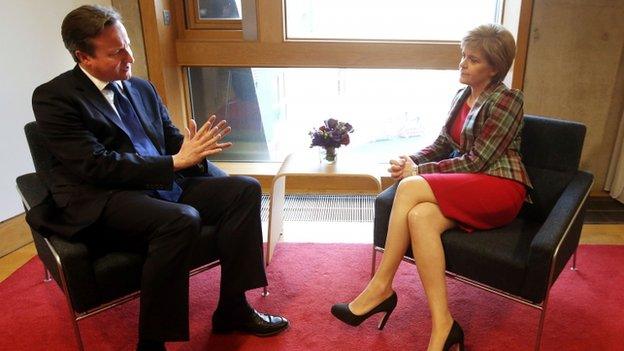
David Cameron and Nicola Sturgeon met at Holyrood on the day new devolution plans were published
The UK government has published plans for new Scottish Parliament powers, but SNP ministers said they had been significantly watered down.
A bill to devolve financial and other powers, external was set out after the "No" vote in September's independence referendum.
Prime Minister David Cameron said Westminster ministers had kept their promise to strengthen Holyrood.
But Scottish First Minister Nicola Sturgeon said UK ministers would get a veto on Scottish powers in key areas.
Meanwhile, Jim Murphy, the Scottish Labour leader, called for more responsibility to be devolved to local communities.
"Absolute guarantee there is no veto" - David Cameron told the BBC
"There is still a lot of work to be done" - Nicola Sturgeon told the BBC
The Westminster legislation was based on the recommendations of the Smith Commission, set up by Mr Cameron, although it will not be enacted until after the UK election in May.
Its publication came ahead of a meeting between the prime minister and Ms Sturgeon, in Edinburgh.
The Conservatives, Labour and the Liberal Democrats have all pledged to ensure the new Scotland Bill becomes law, whoever wins the election.
Speaking in the Scottish capital, Mr Cameron said proposed legislation, contained in a command paper, had delivered the so-called "vow" on new Holyrood powers made by the pro-Union parties ahead of the referendum has been delivered ahead of schedule.
"Scotland spoke, we listened and now here we are delivering," said the prime minister.
"Now it is time for all of us to move on to the next great debate - not what the powers should be, but how they should actually be used.
"We need a battle of ideas about the economy, about jobs, about schools and hospitals, about the future of a great country making the most of every opportunity in front of it."
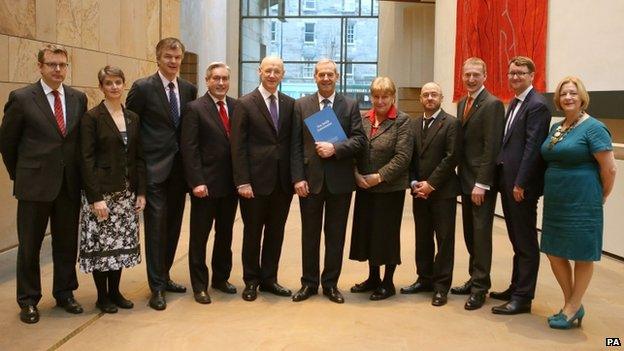
Recommendations were made by members of the Smith Commission
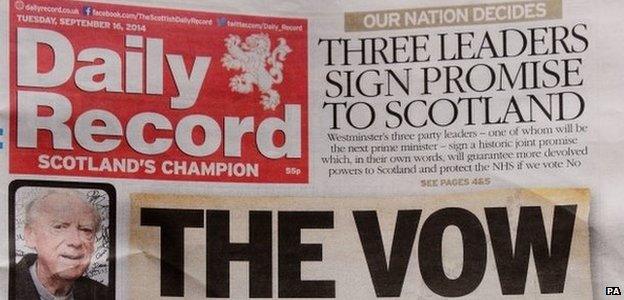
The first step to new powers for Scotland was "the vow" published in the Daily Record
Mr Cameron added: "What we're publishing today is the best of both worlds - our vow kept, Scotland's place in the United Kingdom strengthened, the Scottish Parliament more powerful, responsible and accountable to its people and powers that are built to last, securing our united future."
The Smith Commission recommended the Scottish Parliament be given the power to set income tax rates and bands, but not to alter the threshold above which tax is paid.
It also proposed a proportion of VAT raised in Scotland should be assigned to Holyrood and air passenger duty fully devolved.
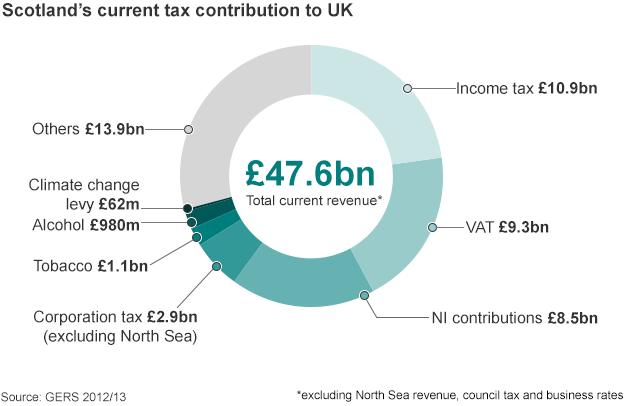
Elsewhere, the commission, chaired by Lord Smith of Kelvin, called for the devolution of a range of benefits to support older people, carers and disabled people and said the parliament should be able to create new benefits in devolved areas and make discretionary payments in any area of welfare.
But Ms Sturgeon said, under the proposals, the UK government would hold a veto over key devolved powers, including the ability to "abolish the bedroom tax", and called for an urgent rethink of what was on offer.
She said: "The legislation published today does not represent the views of the Scottish government, but it does represent some progress.
"However, too much of what the prime minister has set out imposes restrictions on the recommended devolved powers and would hand a veto to UK ministers in key areas."

ANALYSIS
By Brian Taylor, BBC Scotland political editor
The chancellor has forecast "tax competition" as a consequence of the new powers being devolved to Scotland.
Today we had competition of a different kind as sundry political leaders jostled for attention.
Usually, a government publishes its plans - with an intention to legislate. Today's scheme is different.
It would fall to be implemented by a government, yes, following the UK General Election in May.
But a government of which colour? By a single party or a coalition or another form of agreement? Who would wield influence over delivery?
So each party places a different interpretation, a different emphasis upon aspects of the document and draft clauses. It is a single transferable plan.
These differing interpretations arise from different readings of the document.
But they also arise from politics - from the wish to present competing visions of Scotland's future to the electorate.
This is about the law. But it is also about the election.
Read more from Brian.

The Scottish first minister said the proposals on welfare would not allow Holyrood ministers to vary Universal Credit without the permission of the UK government.
Ms Sturgeon added: "At the same time, the power argued for by stakeholders to create new benefit entitlements in any devolved area has simply not been delivered, while the command paper makes clear that, pending devolution of disability support, the roll-out of personal independence payments and the cut to spending on disability benefits will continue.
"This cannot, under any interpretation, represent the meaningful progress on the devolution of the powers we need to design a social security system that meets Scotland's needs."
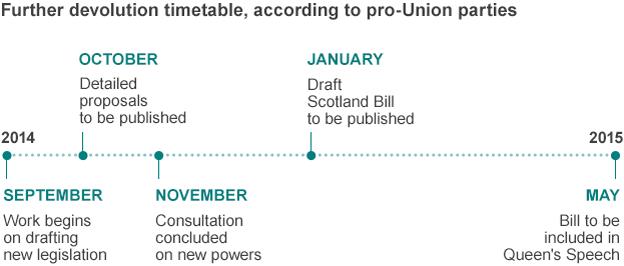
Mr Cameron said later in a BBC interview he could "absolutely guarantee there is no veto", while Scottish Secretary Alistair Carmichael insisted there would be "no backsliding" when it came to delivering new powers.
The transfer of powers to allow 16 and 17-year-olds to vote in Scottish parliamentary elections - another Smith recommendation - has already been agreed.
Mr Murphy said the UK government publication was "modern Home Rule delivered," adding: "It's the vow that everyone spoke about being achieved.
"This is an important day for Scotland. We have more power than ever before in our great country - but I want to go further."
He added: "I would like to see local communities and our cities have the ability to introduce new social security benefits to help people to get back into work."